At the Jewish day school I attended, critical thinking was encouraged and revered in all topics — except for Israel. Our Israel education emphasized biblical promises of a prosperous land for the Jews, a narrative that felt overly simplistic and one-sided. There was no mention of other peoples who share our land. Transitioning to a public high school, and later to American University and Tulane University, I was in a minority for the first time, surrounded by diverse backgrounds and opinions. In high school, my involvement with the Model U.N. team led me to explore a topic about Israel, which became a portal to extensive research, unveiling insights that were profoundly enlightening and unfamiliar to me.
During my junior year, I experienced a defining moment that shifted my perspective. I joined a prestigious writing program aimed at training Jewish pro-Israel activists, primarily emphasizing advocating for Israel’s stance on college campuses, while neglecting the importance of understanding “the other” — the Palestinians.
The program portrayed the Palestinian side through a strictly Jewish viewpoint, simplifying complex issues into one-dimensional narratives. These narratives were crafted for quick counter arguments for debate, conveniently leaving out challenging elements of Israel’s history, thereby promoting a specific viewpoint while ignoring the conflict’s intricacies. The program emphasized being right and staunchly defending Israel’s position, rather than fostering reconciliation, engaging in intellectual discussions or exploring possibilities for coexistence with the Palestinians.
A turning point was a trip to Israel with the program, where we met students from a school, Givat Haviva International School, where Arab-Israelis, Palestinians and Israeli Jews studied together. Among them was a Palestinian student, the singular Palestinian voice on the trip, whose perspective was the only one challenged by our program leaders.
Listening to her lived experiences was eye-opening; despite interacting with renowned journalists, activists and security experts, I realized the program had not equipped me to fully grasp or address the deeper, unresolved questions about Palestine. While I was not the only student on the trip who grew critical, we were instructed to keep any criticism of specific Israeli policies within our group and uphold our firm pro-Israel stance because it was believed that expressing these criticisms publicly might inadvertently contribute to antisemitism on campus.
The lack of acknowledgment of the Palestinian narrative and experience underscored the limitations of my education and ignited a desire to seek a more comprehensive understanding of the conflict. It was at Givat Haviva, listening to these diverse voices, that my understanding began to deepen. Through both academic research and forming friendships with Palestinians, I gradually uncovered the concept of multiple truths, a nuanced reality that had been absent in my earlier education. This journey illuminated the complexities of narratives I had only glimpsed as a child, fostering a more comprehensive and empathetic understanding of the multifaceted nature of the Israeli-Palestinian conflict.
When I enrolled at American University, before transferring to Tulane, I encountered extreme anti-Israel sentiment that often veered into outright antisemitism. This rhetoric, often expounded by well-intentioned progressives, echoed age-old antisemitic stereotypes. As Jewish students, our education on antisemitism had been limited, leaving us ill-equipped to navigate these complex messages.
Consequently, we increasingly viewed any critique of Israel as inherently antisemitic and dismissed it without due consideration, overlooking the harsh reality of Israeli occupation. As a proud Jewish student, deeply critical of Israel but a firm believer in its right to exist, I was left struggling to articulate my discomfort and unease. Significant efforts are needed to address the very real issue of antisemitism within the pro-Palestine movement and on college campuses. However, this should not lead to the dismissal of all critiques of Israel or the curtailment of free speech.
I love Israel, and being Jewish is the largest part of my identity. When a Jew goes to Israel, they feel an inexplicable feeling of comfort.
But Israel is my country — it is not my Disney World.
Israel is more than just a homeland to me; it’s a nation where my deep-seated values of democracy and human rights are tested. Recent reports, such as those from Haaretz, have highlighted concerning aspects of Benjamin Netanyahu’s policies. His approval of Qatar’s cash flow to Hamas, a method less traceable than bank deposits, has reportedly strengthened Hamas’ military capabilities since 2012.
Simultaneously, his government has been restricting essential supplies to Gaza and supporting extremist settlers in the West Bank, leading to the displacement of Palestinian families. A particularly alarming development was the appointment of Itamar Ben-Gvir, a member of Otzma Yehudit, as national security minister and civilian governor of the West Bank.
Ben-Gvir, known for displaying a photo of Baruch Goldstein, who was responsible for the Hebron massacre — exempted from mandatory conscription due to involvement in the ultra-nationalist terrorist organization Kach — is now in a significant position of power. He was granted a national guard, essentially a “private militia,” adding to the growing concerns. The situation is further exacerbated by the systematic demolition of Palestinian homes and the construction of illegal Israeli settlements in the occupied West Bank.
In January 2023 alone, Israeli authorities reportedly demolished 132 Palestinian structures across 38 communities, including residential and donor-funded structures like schools. This represents a significant increase from the previous year and includes punitive demolitions.
Moreover, the Israeli government’s restrictions on public displays of the Palestinian flag stand as another point of contention. These actions, collectively, raise serious questions about human rights and democratic values, making it difficult for those concerned about these issues to remain silent.
Especially in the climate of the current war, the actions of mainstream American Jewish institutions like the Jewish National Fund and the American Israel Public Affairs Committee require critical reassessment. The JNF, once a symbol of my childhood support for Israel, is now known to me for practices that lead to the eviction of Palestinian families, a stark embodiment of complicity in the occupation. This reflects a broader trend among established Jewish organizations in America, where support for Israel often ignores or rationalizes the occupation’s impact on Palestinians, influencing the American Jewish community’s perception of the Israel-Hamas conflict and their own identity.
This entrenchment in the occupation — or at the very best, complicity — is emblematic of a broader trend among established Jewish organizations in America, where support for Israel often overlooks or rationalizes the occupation’s impact on Palestinians. This trend has profound implications in sustaining the status quo and in molding the American Jewish community’s views on the current conflict and their own identity.
Organizations like AIPAC have invested heavily in shaping public opinion, suggesting that providing unlimited and unconditional military aid to Israel is a non-partisan stance essential for the safety and security of the American people and Jewish people. This stance, often presented as a core Jewish value, has permeated Jewish communal life. The lack of room for critical examination of Israeli policies amongst the Jewish community leads to their disconnect in responses to events in Israel.
The lack of support from major Jewish American organizations for the hundreds of Israelis protesting the judicial reform bill last spring, which aimed to consolidate power in the ruling party amongst a political culture of severe democratic back-sliding, was a critical moment that exemplifies a disconnect between proclaimed values and democratic principles at stake. The unwavering support for organizations that dismiss criticism against Israel may have significant implications for both Israeli and American democratic principles. AIPAC’s endorsement of candidates who contested the 2020 American election results starkly contradicts the democratic ideals they claim to uphold.
This discrepancy raises questions about their role in apolitical Jewish spaces like Tulane University Hillel. Given AIPAC’s political slant and its status as a non-religious organization, its influence within Jewish communal spaces merits close scrutiny and revaluation.
The discourse surrounding Jews voices that oppose the occupation is complex. In mainstream Jewish spaces, anti-occupation activism is often met with criticism and dismissal. Accusations of being “not Jewish enough” or fitting into the “angry blue-hair liberal” stereotype is common. My experiences as a young Jewish adult have shown me that misinformation and extreme, hateful and antisemitic views, such as support for Hamas — recognized as a terrorist organization by many countries, including the United States — can cloud discussions.
Though antisemitism is a pervasive issue and must be countered, we shouldn’t conflate hate with legitimate criticism of Israeli policy, violations of international law and military tactics. In American culture, it’s generally accepted, even encouraged, to question and critically analyze our government’s policies. However, within many Jewish spaces, this norm appears to shift when it comes to Israel. I find it perplexing that questioning Israel’s commitment to ensuring a just and viable political path for the safety and freedom of all people in Israel, Gaza and the West Bank is often viewed as treasonous or disloyal. Amid the atrocities of Oct. 7 and the subsequent war, we are often told it is not the time for criticism. However, now is exactly the time to ask questions. Who was killed and why? Is this level of death and destruction justified even when the military aims have yet to be achieved?
Legitimate criticism of Israel may shatter your fundamental axioms as it did mine, and it’s a human reaction to see this as a personal attack and hastily dismiss all criticism as antisemitism. Rejecting the binary and holding multiple truths in such a polarizing environment does not delegitimize your opinions. In fact, it breeds empathy and compassion. Being Jewish means coming from a long line of resilient people who challenge the status quo. Why should I be any different?













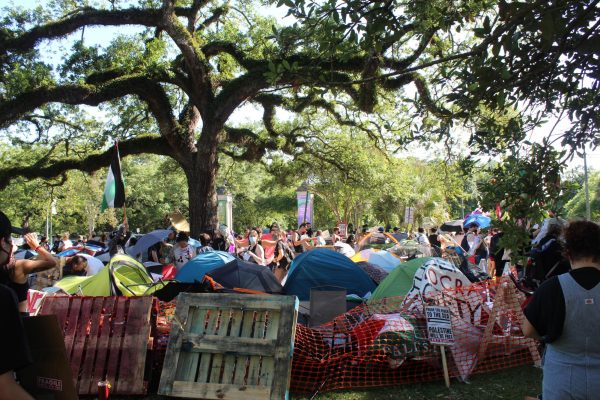


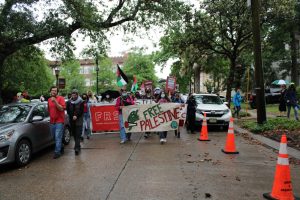
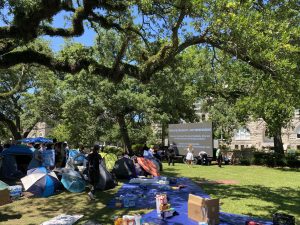

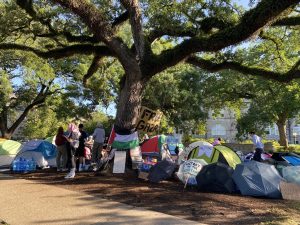
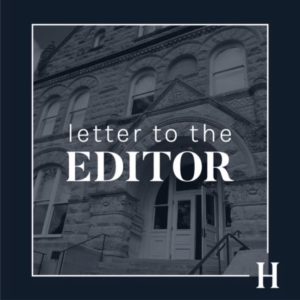

Leave a Comment